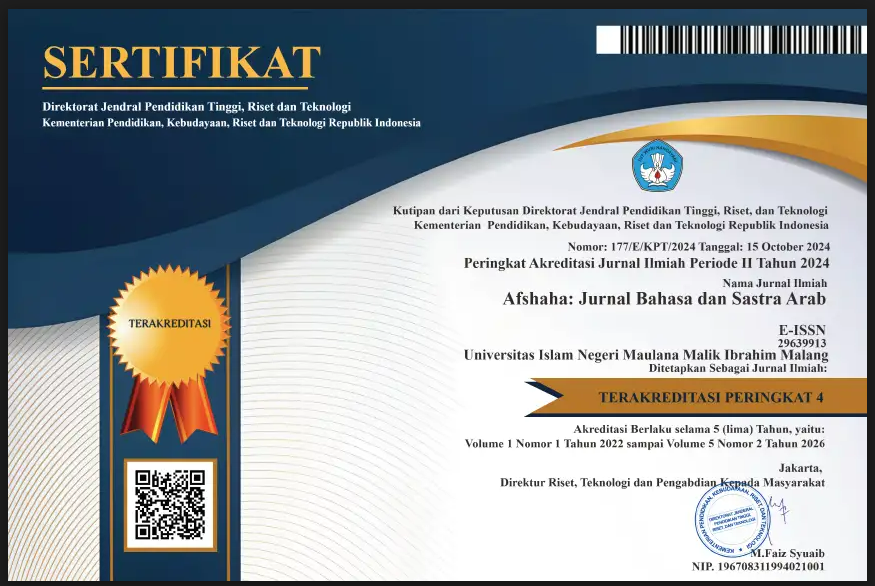DIMENSI KEJENIUSAN MAJIDAH DALAM NOVEL “AL-MAJIDAH ZIKRAYATU BILA ḤIBRIN WA WARAQIN” PERSPEKTIF LE GÉNIE FÉMININE JULIA KRISTEVA
Abstract
Full Text:
PDFReferences
Abunasser, R. (2015). Arab Women, Revolutionary and Post-Revolutionary Discourse. Panorama Strategic Sectors Culture and Society. IEMed. Mediterranean Yearbook. 316-319.
Al-Burgutsiy, A. G. (2012). Al-Majidah Żikrayatu Bilā Ḥibrin Wa Waraqin. Muassasah al- Farsan wal-Nasyr al-Tauzi’.
Al-Mahadin, S. (2011). Arab Feminist Media Studies : Towards a poetics of diversity. Feminist Media Studies, 11(1). 7-12. DOI : https://doi.org/10.1080/14680777.2011.537018
Amireh, A. (2000). Aran Feminism in Transnational World. The University of Chicago Press. Autumn, 2000, 26(1). 215-249.
Coleman, I. (2011). Women and the Arab Revolts. The Brown Journal of World Affairs, 18(1). 215-228.
Cooke, M. (1986). Telling Their Lives, h. A Hundred Years of Arab Women's Writings. World Literature Today. Literatures of the Middle East, h. A Fertile Crescent, 60(2). 212-216. DOI: https://doi.org/10.2307/40141684
El Saadawi, N. (1977). The Hidden Face of Eve, Perempuan dalam Budaya Patiarki. Zulhilmiyasri. 2001. Pustaka Pelajar : Yogyakarta.
Faruk. (2012). Metode Penelitian Sastra: Sebuah Penjelajahan Awal. Pustaka Pelajar: Yogyakarta.
Goodnow, K. J. (2010). Kristeva in Focus From Theory to Film Analysis. New Zealand: Berghahn Books.
Heriyati, N. (2020). Dekonstruksi Perempuan Abjek dalam Tiga Cerpen Karangan Intan Paramadhita. Wanastra, 12(2). 259-265. DOI : https://doi.og/10.31294/w.v12i1
Kristeva, J. (1992). Black Sun. Depression and Melancolia. (Leon S. Roudiez, Trans.). Colombia University Press: New York. (Original Work 1989).
Kristeva, J. (1999). Le Génie Féminin : Hannah Arendt. Folio Essais: Fayard.
Kristeva, J. (1999). Le Génie Féminin : Colette. Colette Un Genio Femminile. Suzanne Delormes dan Mario Flain. 2012. ObarraO edizioni
Kristeva, J. (2001). Le Génie Féminin : Melanie Klein,Melanie Klein. Ross Guberman. Colombia University Press: New York.
Kristeva, J. (2004). Is There a Feminine Genius?. The University of Chicago Press, 30(3). 493-504. DOI : https://doi.org/10.1086/421159
Kristeva, J. (2006). Hannah Arendt Prize for Political Thought. Retrieved from http:/www.kristeva.fr/Arendt_en.html
Lecthte, J. (2013). Julia Kristeva. London And New York: Routlede Taylor & Fracis Group.
Midttun, B. H. (2006). Crossing the Borders, An Interview with Julia Kristeva. Hypatia, 1(6). 164-177.
Mosse, J. C. (1996). Half the World, Half A Chance An Introduction to Gender and Develpoment, Gender dan Pembangunan. Pustaka Pelajar: Yogyakarta. (Original work published 1993).
Shalghin, A. (2017). Toward Understanding Arab Women's Cultural Landscapes, International Journal of Comparative Literature and Translation Studies, 5(2):14. DOI: https://doi.org/10.7575/aiac.ijclts.v.5n.2p.14
Udasmoro, W. (2022). Menjadi Subjek dalam Perspektif Para Feminis Perancis Simone de Beauvoir, Gisele Halimi, Luce Irigaray, Julia Kristeva, dan Helene Cixous. Fakultas Ilmu Budaya UGM: Yogyakarta.
DOI: https://doi.org/10.18860/afshaha.v3i1.23039
Refbacks
- There are currently no refbacks.
Copyright (c) 2024 Afshaha: Jurnal Bahasa dan Sastra Arab

This work is licensed under a Creative Commons Attribution-ShareAlike 4.0 International License.
Member of:
Indexed by:
Editorial Office
Faculty of Humanities, Universitas Islam Negeri Maulana Malik Ibrahim Malang
Jalan Gajayana 50 Malang, Jawa Timur, Indonesia 65144
Phone (+62) 341 551354, Facsimile (+62) 341 572533
e-mail: afshaha@uin-malang.ac.id

Afshaha: Jurnal Bahasa dan Sastra Arab by Faculty of Humanities Universitas Islam Negeri Maulana Malik Ibrahim Malang is licensed under a Creative Commons Attribution-ShareAlike 4.0 International License.
Afshaha: Jurnal Bahasa dan Sastra Arab, e-ISSN: 2963-9913











